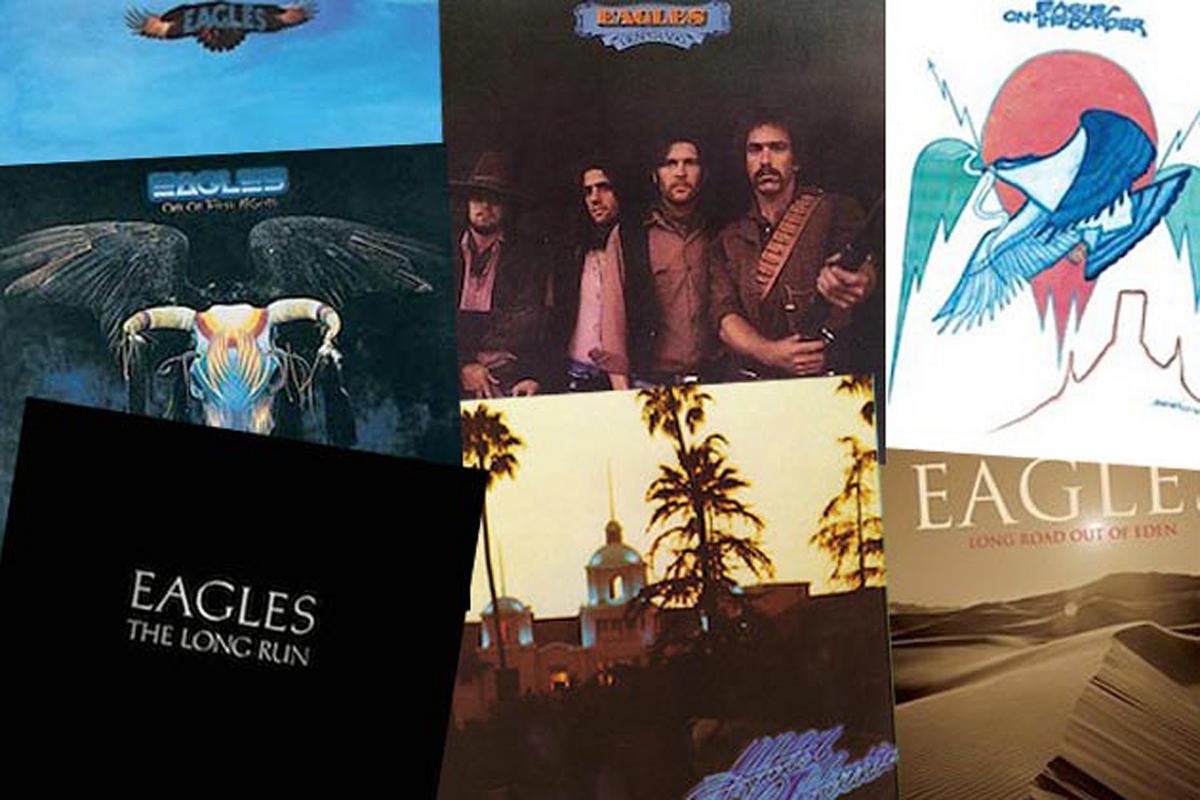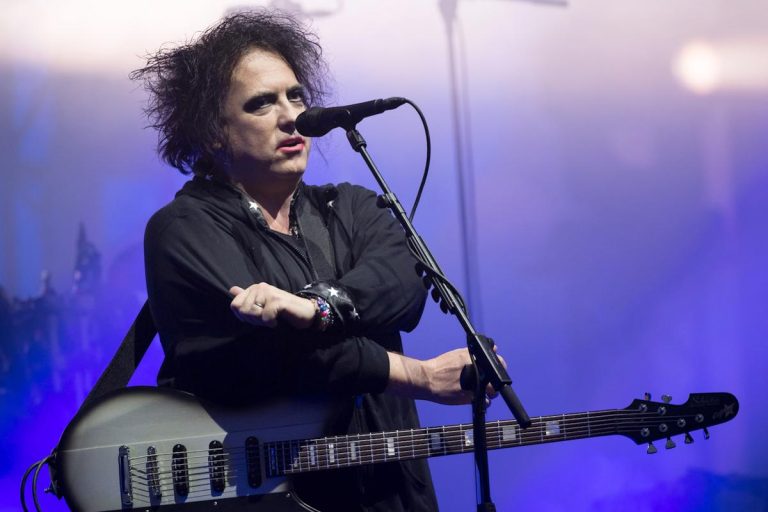Most Eagles narratives revolve around Glenn Frey and Don Henley. After all, they quickly emerged as the group’s main songwriters and singers, then fronted most of their hits.
But Frey and Henley always had their share of talented bandmates. The original Eagles lineup included the gorgeous-voiced Randy Meisner and instrumental whiz Bernie Leadon. Later incarnations featured sizzling guitarist Don Felder, legendary goofball Joe Walsh and the warm-hearted Timothy B. Schmit.
Leadon left first, as the band drifted from its rootsier early sound into harder-edged rock in the mid-’70s. Meisner followed him out the door in 1977. Felder and then Walsh helped toughen things up, while Schmit assumed Meisner’s role as the group’s romantic. As shown in the following list of Top 20 Eagles Songs Not Sung by Don Henley or Glenn Frey, each made important contributions along the way.
READ MORE: Ranking Every Eagles Solo Album
They didn’t simply compliment tracks from Frey and Henley; they completed the group’s larger narrative. The best Eagles albums were balanced by the others. Their unexpected reunion after a long ’80s-era break could only have been completed with deft touches from the others.
Henley continued to lead the band, even after the unexpected death of Frey. But Schmit and Walsh remained a fixture out on the road, as did a number of these songs. Some are memorable singles while others are treasured deep cuts. But without them, this legendary discography would’ve been missing something.
No. 20. “Visions”
From: One of These Nights (1975)
Written by Don Felder with an assist from Don Henley, this riffy, Southern rock-informed track is the only Eagles song to feature Felder on lead vocals. He’ll never be confused with the group’s better-known singers, but thankfully, Felder’s scorching runs on his main instrument provide plenty of gritty distractions.
No. 19. “Most of Us Are Sad”
From: Eagles (1972)
Glenn Frey gave this to Randy Meisner to sing, perhaps because it wasn’t his best stuff. “Most of Us Are Sad,” despite the crushing title, only hinted at the beautiful ache that Meisner would soon bring to their ballads.
No. 18. “Twenty-One”
From: Desperado (1973)
With “Twenty-One,” and later on “My Man” from 1974’s On the Border, Bernie Leadon proved he wasn’t much of a lyricist. But he was the most talented instrumentalist the Eagles ever had –and his picking-and-grinning approach here is just contagiously fun.
No. 17. “Guilty of the Crime”
From: Long Road Out of Eden (2007)
There was typically more country than rock on the Eagles’ final studio effort, save for notable examples like “Guilty of the Crime.” Unfortunately, Joe Walsh disappears into a rather faceless song co-written by Frankie Miller and the late Jerry Lynn Williams, the latter of whom composed a bunch of boring songs for Eric Clapton, too.
No. 16. “Take the Devil”
From: Eagles (1972)
Meisner’s first original composition for Eagles was the dirge-y, hookless “Take the Devil,” showing that he really didn’t know how to showcase his best vocal attribute yet either. Still, Frey’s crunchy closing guitar solo hints at bigger, often unrecognized successes to come.
No. 15. “I Don’t Want to Hear Any More”
From: Long Road Out of Eden (2007)
Paul Carrack contributes another showcase for Timothy B. Schmit, though the sweetly forgettable “I Don’t Want to Hear Any More” will never live up to the heights of “Love Will Keep Us Alive.”
No. 14. “Journey of the Sorcerer”
From: One of These Nights (1975)
This Leadon instrumental begins as a delicately conveyed aside before taking on epic proportions with the arrival of a surging orchestra and featured violinist David Bromberg.
No. 13. “Is It True?”
From: On the Border (1974)
Randy Meisner’s later growth as a songwriter is one of the Eagles’ intriguing secondary storylines. “Is It True?” was the first hint that he could more fully emerge from behind the long shadows of Frey and Henley, as Meisner offered a lovelorn, nearly complete ballad. He left in an unfortunate line about chainsaws during the middle eight, but Frey saves things with another sharply drawn turn on lead guitar.
No. 12. “Too Many Hands”
From: One of These Nights (1975)
Meisner co-wrote this smart twist on an old religious trope with Felder, who’d just become an official member. In keeping with Felder’s arrival, “Too Many Hands” also takes one of the final long strides away from the pastoral sounds of their earlier albums. Felder tangles with Frey on a dueling guitar-dominated outro, while Henley happily bangs away on the tabla.
No. 11. “Do Something”
From: Long Road Out of Eden (2007)
Timothy B. Schmit’s best showing on the Eagles’ final album is a steel-tinged story song with a defeated sensibility that would have fit in nicely among the deepest sighs on The Long Run.
No. 10. “Tryin'”
From: Eagles (1972)
Just because Randy Meisner had such facility with heartsick balladry doesn’t mean he couldn’t catch a groove. His original “Tryin'” finally gave Meisner a worthy piece of material, but not until their debut album’s very last moments.
No. 9. “Last Good Time in Town”
From: Long Road Out of Eden (2007)
Joe Walsh wasn’t much of a presence on Eagles’ long-awaited follow-up to 1979’s The Long Run, singing on just two tracks. This is actually his only credited co-write; Walsh contributed the verses while longtime Eagles collaborator J.D. Souther crafted the chorus. Still, “Last Good Time in Town” – with its winking tributes to the joys of home life after giving up the high life – sounds 100% Walsh.
No. 8. “Train Leaves Here This Morning”
From: Eagles (1972)
This track eventually became something of a signature moment for Bernie Leadon, who was revisiting a song he co-wrote with Byrds cofounder Gene Clark for 1968’s terrific but commercially disappointing Fantastic Expedition of Dillard & Clark. By the time Leadon became part of Eagles’ first lineup, after a similarly ignored detour in Flying Burrito Brothers, country rock was no longer the outlier it had once been – and “Train Leaves Here This Morning” was born anew.
No. 7. “Love Will Keep Us Alive”
From: Hell Freezes Over (1994)
This song grew out of a shelved late-’80s supergroup featuring then-former Eagles Timothy B. Schmit and Don Felder, Jim Capaldi (Traffic), Paul Carrack (Squeeze, Mike + the Mechanics) and Max Carl (38 Special, Grand Funk Railroad). Schmit revived the idea when the Eagles mounted a surprising comeback.
No. 6. “Bitter Creek”
From: Desperado (1973)
Leadon wrote and sang this album’s final original, before the “Doolin-Dalton”/”Desperado” reprise closes out Desperado. The track begins just as you’d expect from the Eagles’ stalwart traditionalist: reserved country rock – maybe too reserved. But then something happens about three minutes in, when the rest of the group joins Leadon’s wordless harmonizing on the outro. “Bitter Creek” takes flight.
No. 5. “I Can’t Tell You Why”
From: The Long Run (1979)
Poor Timothy B. Schmit. The first Eagles song to feature Meisner’s replacement was also the first to be completed for The Long Run. Then it became a very long run indeed, as sessions dragged on from March 1978 through September 1979. “I Can’t Tell You Why,” with one of Frey’s most expressive guitar solos, wasn’t released as the LP’s third single until February 1980. By July, the Eagles were wandering into a lengthy hiatus.
No. 4. “In the City”
From: The Long Run (1979)
Joe Walsh had already released his own version of “In the City,” as part of the soundtrack to 1979’s cult classic The Warriors, when Eagles approached him about rerecording the song for their long-delayed new album. Musically, the approach was lighter but largely the same; the major difference is their gorgeous vocal blend. Later, after “In the City” had become a live and radio staple, the Eagles added a memorable reference to the Beatles‘ “Day Tripper” onstage.
No. 3. “Pretty Maids All in a Row”
From: Hotel California (1976)
The Eagles completed their shift from shaggy roots band to full-on rockers as Walsh took over for Leadon. Nobody else could have come up with the riff for “Life in the Fast Lane,” Walsh’s other major contribution to Hotel California. That said, “Pretty Maids All in a Row” couldn’t have been more different. An emotional meditation on regret, the song catches a different gear when his new bandmates join the vocal finale – but not before Walsh tears off a mournful slide solo. Rock’s clown prince has rarely been more revealing.
No. 2. “Try and Love Again”
From: Hotel California (1976)
Some days, this tucked-away album cut feels like the best song on the Eagles’ most celebrated studio project. A soaring anthem about believing against all odds, “Try and Love Again” had an appropriate theme for the often-forgotten Randy Meisner. Ultimately, however, he couldn’t live up to that promise. “Try and Love Again” would be Meisner’s final co-writing credit – and his final lead vocal – with the group he co-founded.
No. 1. “Take It to the Limit”
From: One of These Nights (1975)
As “Take It to the Limit” became Eagles’ highest charting single yet, Meisner found himself under crushing pressure to hit the song’s heart-rending high note onstage night after night. Panic apparently began to creep in, and he asked that the song – despite its massive popularity – be removed from the band’s sets. When the rest of the Eagles refused, Meisner quit. The vocal was first taken over by Frey, then, after Frey’s death, by Vince Gill.
Eagles Live Albums Ranked Worst to Best
Gallery Credit: Nick DeRiso
Six Little-Known Eagles ‘Hotel California’ Facts




Leave a Comment